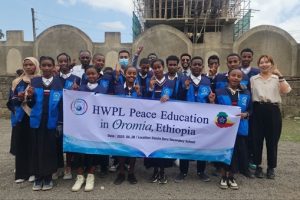
BY MENGESHA AMARE
It is quite obvious that no age, no culture, no religion, no nationality and no region are immune to terrorism. Following its geopolitical strategic location and suitable corridor for every nook and cranny of the globe for carrying out any form of social, economic and even political realm, the Horn of Africa has been grabbing the attention of the entire world, and even the number of individuals, groups or nations as well who would like to garner profit from the destabilization of this universal plot of land is not small.
Hence, a range of factions and anti-peace elements have been hatched and started making turbulence in the region. Simply, there are elements who would like to make the area restless for no reason or little benefit compared with its significance for national, regional, continental and global spheres. Without a shadow of doubt, terrorism constitutes a real threat to democracy, the rule of law and the enjoyment of human rights at every part of the world though the degree varies.
As history would have it and previous experiences have portrayed, many would like to make the Horn a conflict-ridden corridor and source of problems throughout its history, most of them have targeted at creating weak state structures and lapdog administration around the region so as to be suitable for them to be twisted and turned in the direction they would love most.
Following the fluctuating political superstructures and in ever-changing patterns of alignments, both internal and external players are working against the Horn, indeed. Surprisingly, some developed nations have considered the Horn of Africa Kenya, Ethiopia, Djibouti, Somalia, Eritrea, and Sudan a major source of terrorism. Especially following the 9-11 attacks against the United States, the Horn has come under increased scrutiny as a strategic focal point in the war against terrorism.
It has been widely witnessed again that despair, poverty, hunger, lack of basic services, unemployment and unconstitutional changes in government continue to lay fertile ground for the expansion of terrorist groups and the flow of fighters, funds and weapons across the continent.
The necessary ingredients for breaking this cycle of violence are well-known the rule of law, prevention, partnerships, inclusion and respect for international law. Obviously, violent extremism and terrorism remain one of Africa’s most pressing security threats. While terrorism exists everywhere, it is manifesting in a particularly alarming way in Africa, with new groups emerging and existing armed groups joining the internationally designated notorious terrorist organizations.
Hopefully, some of the world nations have paid attention under the auspices of their War on Terror to have a peaceful Horn for the future. Even though the sub region has hosted several intractable conflicts, most took the form of ordinary guerrilla war rather than terrorism; most of them were primarily motivated by political grievances and nationalism.
Somalia has for instance served primarily as a short-term transit point for movement of men and materials through the porous and corrupt border between Somalia into Kenya, which has been a preferred site of terrorist attacks. Obviously, the traditional means of responding to threats to peace, peacekeeping and peace building no longer correspond to new menaces terrorism performed following using myriads of sophisticated scenarios.
Terrorist groups need financing and they use all the means at their disposal to attain it, including new technologies to collect and transfer funds. No place would be left with no terrorism though more keenly done in Africa especially in the Horn, underscoring that terrorists and violent extremists such as Al-Qaida and ISIS as well as their affiliates have exploited instability and conflict to increase their activities and intensify attacks across the continent.
The spread of terrorism in Africa, in our era, is not a concern for African Member States alone and combatting it should not be left only to the countries of the continent. The challenge belongs to all people of the world and their respective nations as actively fighting against this social, economic and even political menace requires the combined effort of all. Countering international terrorism has also required effective multilateral responses that are of expressively useful in addressing concurrent and converging threats such as armed skirmishes, poverty and inequality, lawless cyberspace and the likes.
All Africans must strike a better balance and ensure coherence and complementarity between preventive and militarized responses embarking on the 2030 Agenda for Sustainable Development and the African Union’s Agenda 2063 as crucial tools and viable ways for making the continent land of its aspirations and dreams.
Yes, the numerous regional initiatives to counter terrorism in Africa have highly required the durable commitment and full support of the international community. The Security Council must ensure predictable funding for African Union operations it authorizes, including to counter-terrorism.
A political strategy for counter-terrorism missions must also incorporate projects to provide basic services and better governance in areas where non-State armed groups have gained influence. Africa has to invest in the young generation as empowering them to be active members of society economically, politically, and culturally will make them, and their societies, more resistant to extremist influences in the long run. This would help make terrorism free continent.
The situation in Africa requires swift responses from the international community as the necessary counter-terrorism mechanisms have already been well known. It is quite obvious that the emergence of domestic terrorism, which might have an international impact, is very often linked to disrespect of human rights, lack of legitimacy, and absence of values of freedom and democracy.
Hence, the international community must find better ways to reduce inequality within and across countries; fully and strictly implement the zero finance to terror policy. With terrorism and violent extremism spreading across Africa at an alarming rate, counter-efforts must take into account the socioeconomic drivers of terrorist recruitment, challenges posed by many elements like terrorist Internet propaganda.
However, the fight against terrorism will never succeed if the same denial and destruction of human rights is perpetuated, counter-terrorism efforts that are solely security-focused rather than human-rights-based can inadvertently increase marginalization and exclusion.
Cognizant of the fact that underlining the need to address current and future global challenges that might create instability, the African continent has to focus on ways to promote peace, security and prosperity as these elements are the best response to ideologies inciting terrorist and extremist violence.
Since frustrated youth are easy targets for radicalization, a holistic, tri-dimensional approach that involves zero tolerance for terrorism, alignment of actions with international law and guarding against politicization is badly needed. Besides, sharing information and training of security personnel would be of paramount importance in minifying/loosening the bond among climate change and poverty and instability.
Another important concern here is counter-terrorism solutions should look beyond the military lens, as the root causes of the phenomenon are multifaceted. Africans and other stakeholders have to possess the knowledge and the experience to effectively combat terrorism and terrorists.
Such challenges should be addressed in a coordinated manner in line with relevant resolutions. As well, root causes, such as poverty and inequality, must be addressed as the need for a human-security approach can push the scenario to an end. These days, terrorism continues to represent a major threat to international peace and security. Terrorist groups such as ISIS and Al-Qaida as well as their affiliates also remain the most acute threat, particularly on the African continent, where they are spreading in many parts of it.
This threat is constantly reconfiguring and growing, for example in the Sahel, where terrorist groups are continuing their expansion plans towards the Gulf of Guinea. Not only does the threat of terrorism in Africa affect the Horn region, but also it seriously affects international peace and security as a whole.
Terrorist groups such as ISIS, Al-Qaida and Hezbollah continue to plot attacks against the United States and our allies and partners. As the threats posed by these organizations continue to evolve, the Department of State works to build global consensus to degrade and defeat these adversaries.
Most importantly, in the Horn of Africa, individuals and groups should not progress their political aims by using terror, challenging the democratic values of continent’s societies and putting the rights and freedoms of citizens, especially by indiscriminately targeting people in jeopardy. Since acts of terrorism are criminal and unjustifiable ones; they must be treated as cursed and inhumane under all circumstances across the globe.
In sum, all African states are expected to move in unison and cement their ties than ever before with a view to getting the multifaceted sources of terrorism and potential hatching climates for terrorists via, of course, reinforcing the legal framework against terrorism and violent extremism, preventing and fighting violent radicalization through concrete measures in the public sector, in particular in schools and prisons.
True, as respecting the rule of law, human rights and comply with the principles of democracy and international laws are crucial to truly address the ideologies and driving forces behind emergent violent extremism and terrorism, African countries, not limited to, must run all sorts of activities in tune with such approaches.
Besides, they can come up with meaningful interventions through developing legal standards to prevent and suppress acts of terrorism over and done with criminal law and other measures, which fully respect human rights and the rule of law, as well as toughening international cooperation in a bid to bring terrorists to justice.
The continent of Africa has also devised possible mechanisms to avert the negative repercussions of terrorism including exerting efforts to strengthen law enforcement and judicial capabilities; expand aviation and border security; deepen global information sharing; counter terrorist financing; improve crisis response, and counter violent extremism.
Editor’s Note: The views entertained in this article do not necessarily reflect the stance of The Ethiopian Herald
THE ETHIOPIAN HERALD FRIDAY 21 APRIL 2023





